Blood and Gold tvc-8 Read online
Page 6
But I have come here for you. It is for you that I linger.
He wouldn't fall under her spell. They wouldn't find his body in the snow, the eyes torn out of his face, as they had found so many others. He wanted the memory to go away. He spoke.
"She is my Maker, the red-haired one," he said, "Maharet, the sister of the one who took within herself the Sacred Core."
He paused. He could scarcely breathe he felt such pain.
Marius stared at him intently.
"She had come North to find a lover among our people," Thorne said. He paused, his conviction wavering. But then he continued. "She hunted our clan and the others who lived in our valley. She stole the eyes from those whom she slew."
"The eyes and the blood," said Marius to him softly. "And when she made you a blood drinker, you learnt why she needed the eyes."
"Yes, but not the true story—not the tale of the one who had taken her mortal eyes. And of her twin, I knew not an inkling. I loved her completely. I asked few questions. I could not share her company with others. It made me mad."
"It was the Evil Queen who took her eyes," said Marius, "when she was still human; and from her twin sister, the tongue. That was a cruel injustice, that. And one who also possessed the Blood could not endure it, and so he made them both blood drinkers before the Evil Queen divided them and sent each twin to a different side of the world."
Thorne gasped as he though of it. He tried to feel love inside himself He saw his Maker again in the brightly lighted cave with her thread and her spindle. He saw her long red hair.
"And so it was finished," said Thorne, "the catastrophe I beheld as I slept in the ice. The Evil Queen is gone, punished forever, and the twins took the Sacred Core, yes, but when I search the world for the visions or the voices of our kind I can't find the twins. I hear nothing of them, though I want to know where they are."
"They have retreated," said Marius. "They know they must hide, They know that someone may try to take the Sacred Core from them. They know that someone, bitter and finished with this world, may seek to destroy us all."
"Ah, yes," said Thorne. He felt a chill come over his limbs. He wished suddenly that he had more blood in his veins. That he could go out and hunt—but then he didn't want to leave this warm place and these flowing words, not just now. It was too soon.
He felt guilty that he had not told the whole truth of his suffering and his purpose to Marius. He didn't know if he could, and it seemed a terrible thing now to be under this roof, yet he remained there.
"I know your truth," said Marius gently. "You've come forth with one vow and that is to find Maharet and do harm to her."
Thorne winced as though he'd been struck hard in the chest. He made no answer.
"Such a thing," said Marius, "is impossible. You knew it when you left her centuries ago for your sleep in the ice. She is powerful beyond our imagining. And I can tell you, without doubt, that her sister never leaves her."
Thorne could find no words. At last he spoke in a tense whisper.
"Why do I hate her for the form of life she gave me, when I never hated my mortal mother and father?"
Marius nodded and gave a bitter smile.
"It's a wise question," Marius said. "Abandon your hope of harming her. Stop dreaming of those chains in which she once bound Lestat unless you truly wish for her to bind you in them."
It was Thorne's turn to nod.
"But what were those chains?" he asked, his voice tense and bitter as before, "and why do I want to be her hateful prisoner? So that she can know my wrath every night as she keeps me close to her?" "Chains made of her red hair?" Marius suggested, with a slight shrug of his shoulders, "bound with steel and with her blood?" he mused. "Bound with steel and with her blood and gold, perhaps. I never saw them. I only knew of them, and that they kept Lestat helpless in all his anger."
"I want to know what they were," said Thorne. "I want to find her."
"Forswear that purpose, Thorne," said Marius. "I can't take you to her. And what if she beckoned for you as she did so long ago, and then she destroyed you when she discovered your hatred?"
"She knew of it when I left her," said Thorne.
"And why did you go?" Marius asked. "Was it the simple jealousy of others which your thoughts reveal to me?"
"She took them in favor one at a time. I couldn't endure it. You speak of a Druid priest who became a blood drinker. I know of such a one Mael was his name, the very name you've spoken. She brought him into her small circle, a welcome lover. He was old in the Blood and had tales to tell, and she longed for this more than anything. I turned away from her then. I scarce think she saw me retreat. I scarce think she felt my hatred."
Marius was listening intently. Then he spoke.
"Mael" he said, his words gentle and patient. "Tall and gaunt always, with a high bridged nose and deep-set blue eyes and long blond hair from his servitude in the Sacred Grove. That's the Mael who lured your sweet Maharet from you?"
"Yes," said Thorne. He felt the pain in his chest slacken. "And she was sweet, that I can't deny, and she never spurned me. It was I who wandered away, towards the North land. It was I who hated him for his flattery of her and his clever stories."
"Don't seek a quarrel with her," Marius said. "Stay here with me, and by and by, she may come to know that you're here, and she may send you her welcome. Be wise then, I beg you."
Thorne nodded again. It was as if the terrible battle was over. He had confessed his wrath and it was gone, and he sat still and simple near the fire, the warrior no longer. Such was the magic of words, he thought.
Then memory came again. Six centuries ago. He was in the cave, and could see the flicker of the firelight. He was bound and couldn't move. She lay beside him, peering down into his eyes and whispering to him. He couldn't remember those words, because they were part of something larger and more terrible, something as strong as the threads that bound him.
He could break those threads now. He could cut loose of the memories and lodge himself firmly in this room. He could look at Marius.
He gave a long slow sigh.
"But return to your tale, if you will," he asked. "Why after the Queen was destroyed, and after the twins were gone, why then didn't you reveal your rage to the blood drinker Lestat, why didn't you take your vengeance? You'd been betrayed! And disaster had followed upon it."
"Because I wanted to love him still," said Marius, as though he had long known the answer, "and I wanted to be loved, and I could not forfeit my place as the wise and patient one, as I've said. Anger is too painful for me. Anger is too pathetic. I cannot bear it. I cannot act upon it."
"Wait for one moment," said Thorne. "Say this again?"
"Anger is too pathetic," Marius repeated. "It's too much at a disadvantage always. I can't act upon it. I can't make it mine."
Thorne gestured for quiet. He sat back considering, and it seemed a cold air settled on him in spite of the fire.
"Anger is weak," Thorne whispered. It was a new idea to him. In his mind anger and rage had always been akin. And rage had seemed something akin to Wodin's fury. One summoned rage before going into battle. One welcomed rage into one's heart. And in the ice cave, he had let an old rage awaken him.
"Anger is as weak as fear," said Marius. "Can either of us endure fear?"
"No," said Thorne. "But you're speaking of something inside you that's heated and strong."
"Yes, there is something brutal and hurt inside of me, and I wander alone, refusing the cup of anger, choosing silence rather than angry words. And I come upon you in the North land, and you're a stranger to me, and I can bare my soul to you."
"Yes, that you can do," said Thorne. "For the hospitality you have given me, you can tell me anything. I will never break your trust, that I promise. No common words or songs will ever come from me. Nothing can make such a thing happen." He felt his voice grow strong as he spoke. It was because he was honest in what he said. "What has become of Lestat? Why is he silen
t now? I hear no more songs or sagas from him."
"Sagas, ah yes, that's what he wrote, sagas of our kind," said Marius and again he smiled, almost brightly. "He suffers his own terrible wounds," said Marius. "He's been with angels, or with those beings who claim to be such and they have taken him to Hell and to Heaven."
"You believe these things?"
"I don't know. I can tell you only he wasn't on this Earth while these creatures claim to have had him. And he brought back with him a bloody Veil with the Face of Christ quite beautifully blazoned upon it." "Ah, and this you saw? "
"I did," said Marius, "as I have seen other relics. It was to see this Veil and to go into the sun and die that our Druid priest Mael was nearly taken from us."
"Why didn't Mael die," asked Thorne. He couldn't conceal his own emotion when he said this name.
"He was too old for such a thing," said Marius. "He was badly burnt and brought low, as can happen with those of us who are very old, and after one day in the sun, he hadn't the courage for more suffering. Back to his companions he went and there he remains."
"And you? Will you tell me now with your full heart; do you truly despise him for what he did to you? Or is it your distaste for anger which makes you turn away from this thing?"
"I don't know. There are times when I can't look on Mael's face. There are times when I want to be in his company. There are times when I can't seek out any of them. I've come here with Daniel alone. Daniel always needs someone to look after him. It suits me to be near Daniel. Daniel doesn't have to speak. That he is here is sufficient."
"I understand you," said Thorne.
"Understand this as well," said Marius. "I want to continue. I am not one who wishes to go into the sun or seek some other form of obliteration. If you have truly come out of the ice to destroy Maharet, to anger her twin—."
Thorne lifted his right hand, gesturing for patience and silence.
Then he spoke:
"I have not," he said. "Those were dreams. They've died in this very place. It will take longer for memory to die—."
"Then remember her beauty and her power," Marius said. "I asked her once why she had never taken a blood drinker's eyes for her own. Why always the weak and bleeding eyes of a mortal victim? She told me she had never come upon a blood drinker whom she would destroy or even hurt, save for the Evil Queen herself and the Queen's eyes she couldn't take. Pure hatred prevented it."
Thorne thought on this for a long time without replying.
"Always mortal eyes," he whispered.
And with each pair, as they endure, she sees more than you and I can see," said Marius.
"Yes," said Thorne, "I understand you."
“I want the strength to grow older," Marius said. "I want to find wonders around me as I always have. If I don't, I'll lose the strength to continue and that is what bites into me now. Death has put its hand on my shoulder. Death has come in the form of disappointment and fear of scorn"
"Ah, these things I understand, almost perfectly," said Thorne. "When I went up into the snow, I wanted to flee from these things. I wanted to die and not die, as so many mortals do. I don't think I thought I would endure in the ice or snow. I thought it would devour me, freeze me solid as it would a mortal man. But no such thing ever happened. And as for the pain of the cold I grew used to it, as if it were my daily portion, as if I had no right to anything else. But it was pain that drove me there, and so I understand you. You would fight pain now rather than retreat."
"Yes, I would," said Marius. "When the Queen rose from her underground shrine, she left me buried in ice and indifference. Others came to rescue me and bring me to the council table where we sought to reason with her. Before this happened, I could not have imagined such contempt from the Queen or such injury. I could not have imagined my own patience and seeming forgiveness.
"But at that council table, Akasha met her destruction. The insult to me was avenged with utter finality. This creature whom I had guarded for two thousand years was gone from me. My Queen, gone from me . . .
"And so I can see now the larger story of my own life, of which my beautiful Queen was only a part, even in her cruelty to me. I can see all the stories of my life. I can pick and choose from among them."
"Let me hear these stories," said Thorne. "Your words flow over me like warm water. They bring me comfort. I hunger for your images. I hunger for all you might say."
Marius pondered this.
"Let me try to tell my stories," Marius said. "Let my stories do what stories always do. Let them keep you from your darker dreams and from your darker journey. Let them keep you here."
Thorne smiled.
"Yes," he said, "I trust in you. Go on."
6
THE STORY
As I HAVE TOLD YOU, I was born in the Roman times, in the age of Augustus when the Roman Empire was immense and powerful, though the Northern tribes of barbarians who would eventually overrun it had long been fighting on its Northern frontiers.
Europe was a world of big and powerful cities just as it is now.
As for me, as I've said I was a bookish individual, and it had been my bad luck to be stolen from my world, taken into Druid precincts and there delivered to a blood drinker who believed himself to be a sacred God of the Grove and gave me nothing but superstition along with the Dark Blood.
My journey to Egypt to find the Mother was for myself. What if this fire described by the blackened and suffering god should come again?
Well, I found the Divine Pair and I stole them from those who had long been their guardians. I did it not only to possess the Sacred Core of the Divine Queen but because of my love of Akasha, my belief that she had spoken to me and commanded me to rescue her, and because she had given me her Precious Blood.
Understand there was nothing as strong as that primal fount. The blood rendered me a formidable blood drinker who could fight off any of the old burnt gods who came after me in the years to come.
But you must also understand: no religious impulse guided me. I had thought the "god" of the Druid woods to be a monster. And I understood that in her own way Akasha was a monster. I was a monster as well. I had no intention of creating a devotion for her. She was a secret. And from the moment she came into my hands she and her consort were most truly Those Who Must Be Kept. This did not stop me from adoring her in my heart, and creating the most lavish shrine for her, and dreaming that, having spoken to me once with the Mind Gift, she would speak to me again.
The first city to which I took the mysterious pair was Antioch, a most marvelous and interesting place. It was in the East as we said in those days, yet it was a Roman city and had been shaped by the tremendous influence of Hellenism—that is, the philosophy and ideas of the Greeks. It was a city of new and splendid Roman buildings, and it was a city of great libraries and schools of philosophy, and though I haunted it by night, the ghost of my former self, there were brilliant men to be spied upon and wondrous things to be heard.
Nevertheless my first years as the keeper of the Mother and the Father were bitter in my loneliness, and the silence of the Divine Parents struck me often as particularly cruel. I was pitifully ignorant as to my own nature, and perpetually brooding on my eternal fate.
Akasha's silence struck me as terrifying and confusing. After all, why was I asked by Akasha to take her out of Egypt if she meant only to sit upon her throne in eternal stillness? It seemed sometimes that self-destruction was preferable to the existence I endured.
Then came the exquisite Pandora into my midst, a woman I'd known since her girlhood in Rome. Indeed, I'd once gone to her father to seek her hand in marriage when she'd been only a precocious child. And here she was in Antioch, as lovely in the prime of life as she'd been in her youth, flooding my thoughts with impossible desire.
Our lives became fatally intertwined. Indeed the speed and violence with which Pandora was made a blood drinker left me weak with guilt and confusion. But Pandora believed that Akasha had willed our union; A
kasha had hearkened to my loneliness; Akasha had drawn Pandora to me If you saw our council table, round which we sat when Akasha rose, then you have seen Pandora, the tall white-skinned beauty with the distinct rippling brown hair, one who is now a powerful Child of the Millennia just as you are and just as I am.
Why am I not with her now, you may ask? What is it in me that will not acknowledge my admiration for her mind, her beauty, her exquisite understanding of all things?
Why can't I go to her!
I don't know. I know only that a terrible anger and pain divides us just as it did so many years ago. I cannot admit how much I have wronged her. I cannot admit how much I have lied about my love of her and my need of her. And this need, perhaps this need is the thing which keeps me at a distance, where I am safe from the scrutiny of her soft and wise brown eyes.
It's also true that she judges me harshly for things I have lately done. But this is too difficult to explain.
In those ancient times, when it was scarce two centuries that we lived together, it was I who destroyed our union in a foolish and dreadful way. We had spent almost every night of our lives quarreling, and I could not admit her advantages, and her victories, and it was as the result of my weakness that I foolishly and impetuously left her when I did.
This was the single worst mistake of all my long years.
But let me tell quickly the little tale of how we came to be divided by my bitterness and pride.
Now as we kept the Mother and the Father, the old gods of the dark groves of the North woods died out. Nevertheless an occasional blood drinker would discover us and come to press his suit for the blood of Those Who Must Be Kept.
Most often such a monster was violent and easily dispatched in the heat of anger, and we would return to our civilized life.
One evening, however, there appeared in our villa outside Antioch a band of newly made blood drinkers, some five in number, all dressed in simple robes.

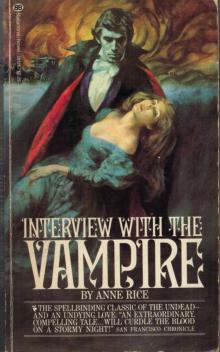 Interview with the Vampire
Interview with the Vampire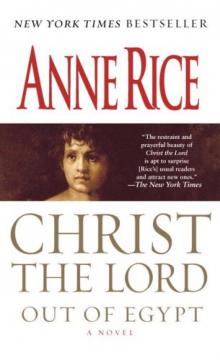 Christ the Lord: Out of Egypt
Christ the Lord: Out of Egypt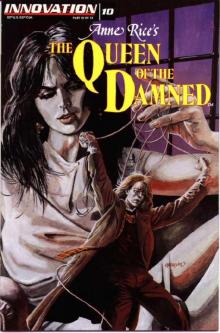 The Queen Of The Damned
The Queen Of The Damned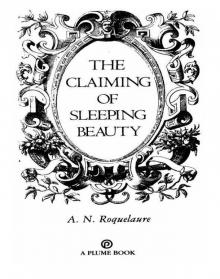 The Claiming of Sleeping Beauty
The Claiming of Sleeping Beauty Prince Lestat
Prince Lestat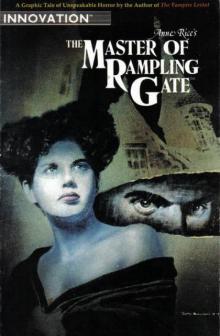 The Master of Rampling Gate
The Master of Rampling Gate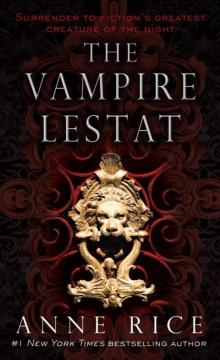 The Vampire Lestat
The Vampire Lestat Blood Canticle
Blood Canticle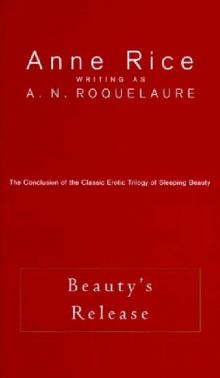 Beauty's Release
Beauty's Release Pandora
Pandora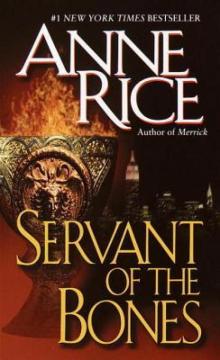 Servant of the Bones
Servant of the Bones Of Love and Evil
Of Love and Evil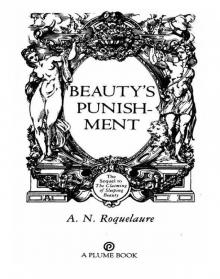 Beauty's Punishment
Beauty's Punishment Cry to Heaven
Cry to Heaven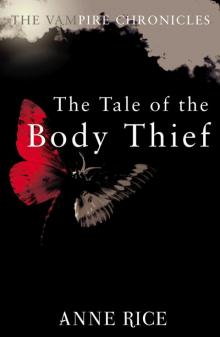 The Tale of the Body Thief
The Tale of the Body Thief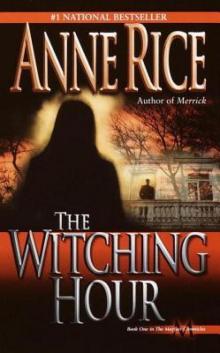 The Witching Hour
The Witching Hour Memnoch the Devil
Memnoch the Devil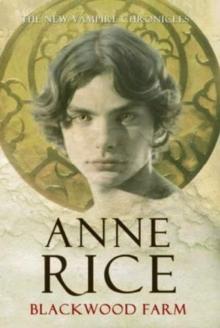 Blackwood Farm
Blackwood Farm Beauty's Kingdom
Beauty's Kingdom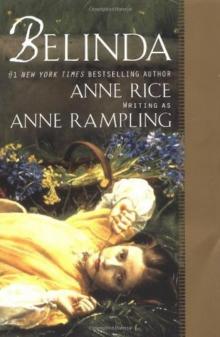 Belinda
Belinda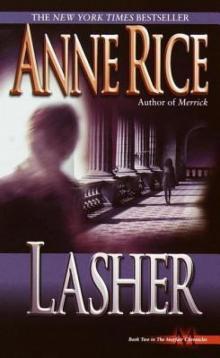 Lasher
Lasher Vittorio, the Vampire
Vittorio, the Vampire Angel Time
Angel Time Called Out of Darkness: A Spiritual Confession
Called Out of Darkness: A Spiritual Confession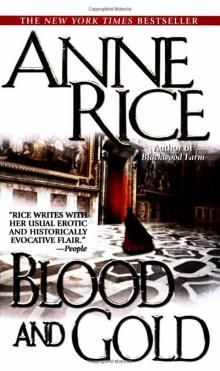 Blood And Gold
Blood And Gold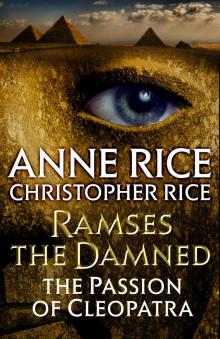 The Passion of Cleopatra
The Passion of Cleopatra Taltos
Taltos Exit to Eden
Exit to Eden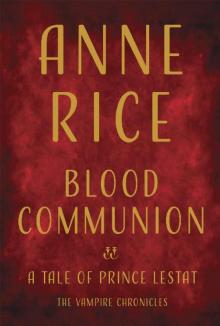 Blood Communion (The Vampire Chronicles #13)
Blood Communion (The Vampire Chronicles #13) The Wolf Gift
The Wolf Gift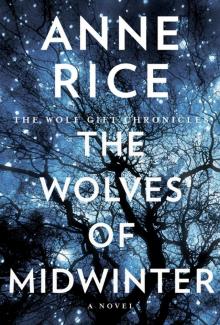 The Wolves of Midwinter
The Wolves of Midwinter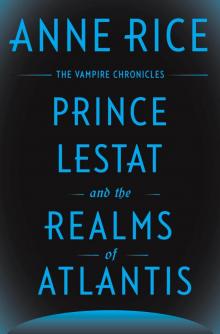 Prince Lestat and the Realms of Atlantis
Prince Lestat and the Realms of Atlantis The Ultimate Undead
The Ultimate Undead The Vampire Lestat tvc-2
The Vampire Lestat tvc-2 The Road to Cana
The Road to Cana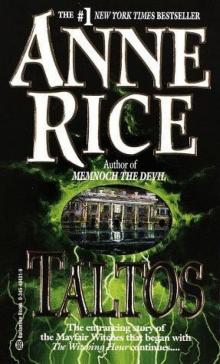 Taltos lotmw-3
Taltos lotmw-3 Merrick tvc-7
Merrick tvc-7 Called Out of Darkness
Called Out of Darkness Pandora - New Vampires 01
Pandora - New Vampires 01 Bllod and Gold
Bllod and Gold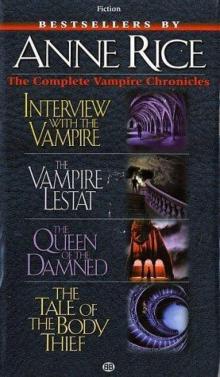 The Queen Of the Damned: Vampire Chronicles
The Queen Of the Damned: Vampire Chronicles The Sleeping Beauty Trilogy
The Sleeping Beauty Trilogy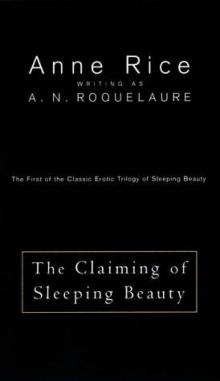 The Claiming of Sleeping Beauty b-1
The Claiming of Sleeping Beauty b-1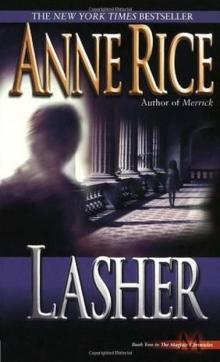 Lasher lotmw-2
Lasher lotmw-2 The Tale of the Body Thief tvc-4
The Tale of the Body Thief tvc-4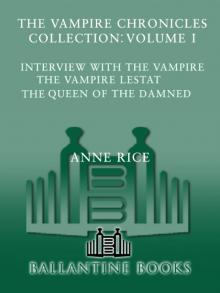 The Vampire Chronicles Collection
The Vampire Chronicles Collection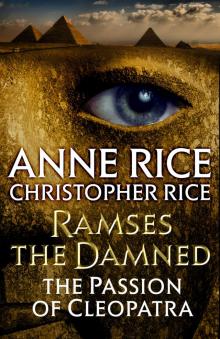 Ramses the Damned
Ramses the Damned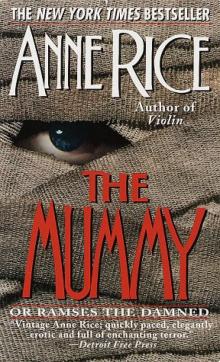 The Mummy - or Ramses the Damned
The Mummy - or Ramses the Damned Vittorio, The Vampire - New Vampires 02
Vittorio, The Vampire - New Vampires 02 The Vampire Armand tvc-6
The Vampire Armand tvc-6 Queen of the Damned tvc-3
Queen of the Damned tvc-3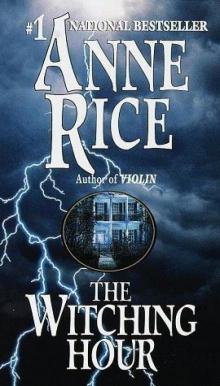 The witching hour lotmw-1
The witching hour lotmw-1 Feast of All Saints
Feast of All Saints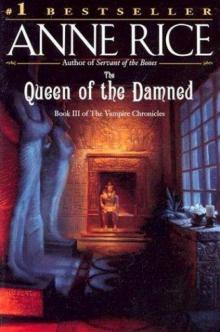 Queen of the Damned
Queen of the Damned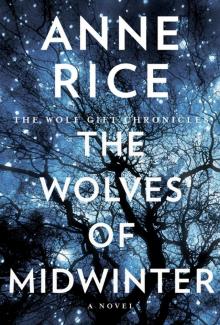 The Wolves of Midwinter twgc-2
The Wolves of Midwinter twgc-2 The Mummy
The Mummy Blood and Gold tvc-8
Blood and Gold tvc-8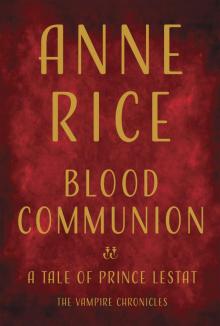 Blood Communion
Blood Communion Interview with the Vampire tvc-1
Interview with the Vampire tvc-1 Prince Lestat: The Vampire Chronicles
Prince Lestat: The Vampire Chronicles